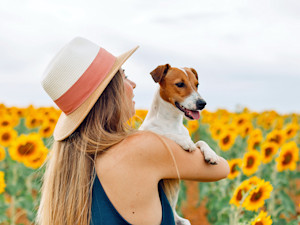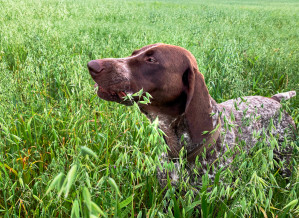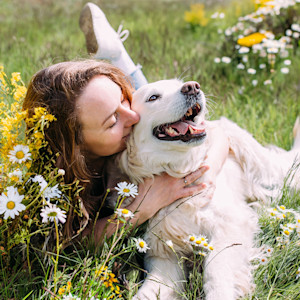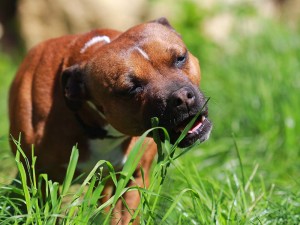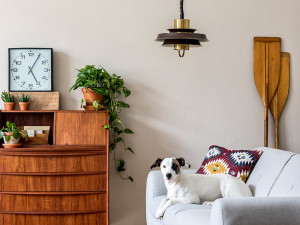Are Dahlias Toxic to Dogs?
They’re pretty additions to any garden, but they’re not pup-friendly.
Dahlias are spectacular flowers that come in every color under the rainbow. They are part of the tuber family, planted in the spring, and will begin to flower in late July, typically lasting until the first fall frosts. The flowers look like beautiful pompoms and can be up to 12 inches tall, but unfortunately, yes, they are toxic to dogs.
Why are dahlias dangerous to dogs?
Veterinarian Dr. Nell Ostermeier says “dogs should not ingest any part of dahlias, as [they] can cause gastrointestinal issues like vomiting and diarrhea. Contact with dahlias can also cause skin irritation.�”
What should I do if my dog has eaten dahlias?
At this time, the exact toxin or reasons why dahlias are poisonous to dogs are unknown. Yet dogs can react when they consume any part of the plant; even rubbing against dahlias can cause issues.
It is best to seek medical assistance if your dog has eaten a dahlia. Try your best to have as much information as you can when arriving at the facility or calling your vet.
How much do you spend on your pet per year?
Diagnosing plant poisoning in dogs
Your vet team needs as much information as possible to help create a treatment plan. They will then check your dog’s pulse and heart rate. A blood test, urinalysis, as well as a serum chemistry, will be taken.
The serum chemistry will check your dog’s proteins, enzymes, lipids, and hormones, which will help your vet better understand how effected your dog’s organs, tissues, and metabolic state are. The results from these exams will help your vet come up with a treatment plan. They may need to induce vomiting and use activated charcoal to help absorb the toxins that your dog has ingested, as well as give IV fluids to help prevent any dehydration.
Symptoms to look out for if your dog ate a dahlia
Gastrointestinal pain
Vomiting
Diarrhea
Abdominal pain
Symptoms to look out for if your dog’s skin came in contact with a dahlia
Skin rash
Blisters
Irritation
Painful red patches
Mild dermatitis
Treatment for dahlia poisoning in dogs
Treatment will vary depending on your dog’s symptoms. They will provide medications based on what your dog is experiencing or might recommend fluid therapy if your pup is dehydrated from vomiting or diarrhea.
How to prevent plant poisoning
Keeping toxic plants away from your dog is the best way to keep them from getting poisoned. You should not keep these plants in any place they can easily access them. When it comes to dahlias, it’s best not to plant them at all.
Are all parts of the dahlia toxic to dogs?
Yes, all parts of the dahlia plant can cause stomach upset in pups.
How do I stop my dog from eating a dahlia?
The best way to stop your dog from eating a dahlia is to keep them away from the plant altogether and to refrain from planting them in any part of your garden or house where they could access them.
The bottom line: Are dahlias poisonous for my dog?
Yes. Keep dahlias away from your dog to help keep them safe.
Other plants that are safe for dogs
Sunflowers (Helianthus angustifolius) are safe for your pup, but it doesn’t mean they should go to town munching on one.
Same goes for Easter lilies ( Lilium longiflorum), though there are several lilies on the list that are not safe for your pup.
Garden marigolds (Calendula officinalis) are another safe option to have around your house in the fall.
Other plants that are dangerous to dogs
Keep peace lilies (Spathiphyllum) away from your dog; if they chew on or ingest them, they could get sick.
Tulips (Tulipa spp.) are also not a safe flower to keep around your pup.
Lavender (Lavendula angustifolia) is pretty in your garden, but you should not let your dog munch on it.
FAQs (People also ask):
How many dahlia flowers can a dog eat?
No amount of dahlia flower is safe for dogs to eat.
Are dahlias good for dogs?
Dahlias are not good for dogs because they can cause an upset stomach or skin irritation.




